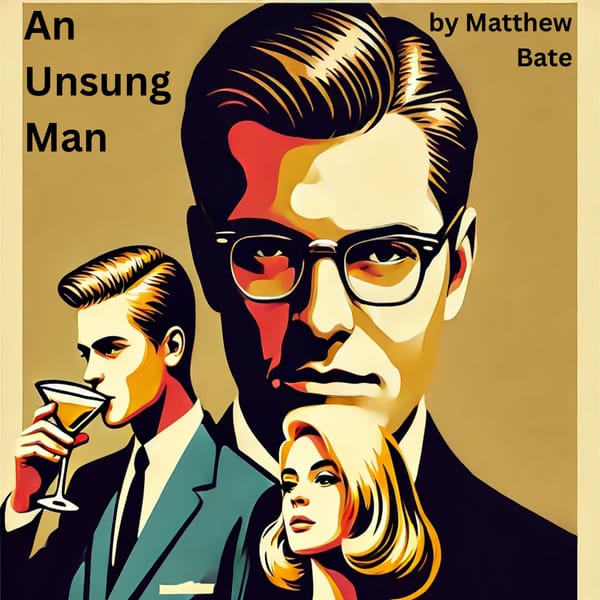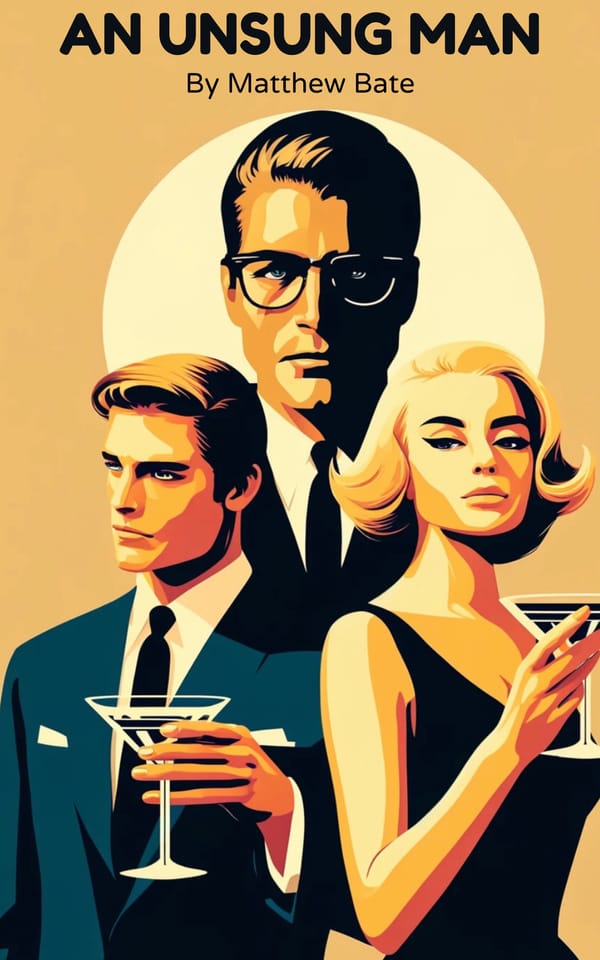Being Wrong
It was 1987, or thereabouts. I was walking through the City of London, the old financial centre, on the way to be interviewed for a job as…

It was 1987, or thereabouts. I was walking through the City of London, the old financial centre, on the way to be interviewed for a job as a toilet paper salesman, which I failed to secure. I know the area well because I had been to many interviews there, and so was striding confidently while rehearsing my youthfulness, brilliance and modesty when I saw a traditional London black cab emerge from a side turning with a passenger in the back. Prosaic as this may seem, what followed became a formative experience.
The man in the back was wearing banker’s armour; dark navy suit, braces (suspenders in the former colonies), probably oxfords, and was talking into a mobile phone. It was the first one I’d seen, and I now know it to have been a Motorola DynaTAC 8000x, something of a classic. I saw progress, but in that company I was distinctly in the minority.
There is a rule in British offices that where there are more than eleven employees, one must be a hearty young lad who will one day be a star salesman; when he’s old enough to be trusted with a company car. He often carries a golf umbrella, drinks lager at lunchtime, and is convinced that we’re all thinking what he’s saying. He has a complexion that will one day be ruddy, but for now resembles an infant’s arse. I’d not met him before but already knew him well. On this occasion, he is out in the wild and keen to share his views.
I was fortunate, if that’s the word, to be looking at his face at the exact moment he saw his quarry and his usual blank incomprehension turned into a shit-eating grin.
“‘Ere, look at this clump” he exclaimed to an audience of strangers, some of whom realised that they had an opportunity to be acolytes. Obviously he didn’t say ‘clump’, but you do know what he did say. I don’t know what was said in other dimensions, but in this one the young man made a series of remarks about his target’s nocturnal habits, which are in any case nothing to be ashamed of in moderation.
Then he kicked the rear door of the cab.
I don’t know if you’ve ever met a London cab driver but they’re not shy, and if you do anything to restrict their earning potential you will hear about it. I was called a clump once because my destination involved ‘Archway’. He didn’t apologise when we sailed through, in a perfect example of the point I’m making, even if I am making it at unnecessary length.
By now our little sketch had the attention of the street, and some seemed to share our hero’s view of someone using a telephone while not at a desk or a small perch in their hallway. The cab driver saw which way the wind was blowing and drove off, carrying the man administering all of our pension funds with him. The ridiculous prick who started this immediately resumed thinking about rugby, and why it’s probably the law that all television series must feature a black person because he can’t think of another reason why.
I’ve often wondered when he got his first mobile phone, and if he ever used it in a cab. I wonder if he boldly told the story to someone in the pub that night and if that person bought it up at the appropriate juncture. He would have laughed it off because now he has one so it’s fine, oblivious of the fact that he caused a public incident while trying to humiliate someone, which is why we can’t have nice things. It’s probably the law that we have to wait until someone on Twitter says it’s OK. We should not be afraid to be the first. We should be shielded from the Met Gala snark, possibly by thinking up a meme we can invoke when someone decides to be a gatekeeper. Don’t ask me I’m terrible at that sort of thing.
I can remember a prominent comedian, upon the launch of the Mac tablet netbook thingy, ridiculing ‘the sort of person who would buy an iPad’.
I can also remember the launch of the iPod.
“I still can’t believe this! All this hype for something so ridiculous! Who cares about an MP3 player? I want something new! I want them to think differently! Why oh why would they do this?! It’s so wrong! It’s so stupid!”
An anonymous poster who was really hoping the new device would change his life.
I sympathise; I can clearly remember the disappointment upon unboxing my Mac to find that I still couldn’t speak Japanese or ride a penny farthing. I even agreed to an extent. As I write this I’ve been a musician for nearly fifty years and I’m sure you can guess what I think of 128kb MP3 files, but that wasn’t a problem for most people. I now have dozens of master tapes in my pocket and I’m pleased to see it.
There are still people who believe that Apple dumbs down its bespoke silicon running UNIX. WatchOS runs on UNIX. Yes, really.
When I look at the cycle paths through a local park, all I see are updated Sinclair C5s piloted with disdain for the history of assisted electric mobility.

My career was badly served by a VC who told me in 2001 that client-side software was dead and that all future innovations would be accessed via a web browser. The app market was US$200bn in 2022. So people being wrong hurts us, be we also hurt ourselves and others. At the same conference, I accepted a strong recommendation from my non-technical boss to be less geeky and use the term ‘item of data’ instead of the correct term, ‘datum’, and that I shouldn’t use the animation for which we paid £7000 because her management guru thought it infantilising and a live database integration to be an attractive presentation when half the audience can’t see the text. I was ridiculed and humiliated by a hundred of my peers, and I owe the late John Perry Barlow my life. I was wrong not to tell him that. We can be wrong, and we can accept other people being wrong. We can also edit what enters our heads, and structure what emerges from them.
I shock people by telling them that I’m wrong. I do it on purpose for the sake of progress. It disarms critics completely. “I’m sorry, I was wrong about that; here’s what we should do about it”. This tactic works if you have played a part in the problem. There is a related, much more manipulative tactic which I will describe for the sake of completeness and which I strongly recommend that you do not try. If you want to learn about politics of either capitalisation you would be wise to watch two British television programmes; Yes (Prime) Minister and The Thick of It. Both are close to perfect and the latter was written by some of the finest writers in the business. In the first episode of The Thick of It, we see a Minister being told by a very wise man why he should resign, and we are then shown the subsequent damage to his career caused by his reticence. A few episodes later we see one of his colleagues performatively resigning and apologising for a problem not of his making. At the end of the show, we see this man become the leader of the party and no doubt the next Prime Minister. The chap from the first episode is still there, spitting bile at those who sought to warn him. I can see it working in real life and I’m sure it has, but don’t do this unless you are a silly sod.
Much of politics, business, and life is about finding problems. Finding and fixing. Every MBA exercise, every public consultation, every meeting. Even if the end result is a solution to a problem you didn’t know you had, such as not having your entire record collection in your pocket or being able to make a call from the back of a cab. New things work when we fit our wants and needs to them. We derive the dreaded term ‘solutions’ from this psychology and we buy and use ’solutions’ all day every day. An obvious corollary is that we can use being wrong as a tool. We can notice not only what is wrong, but what will be seen as wrong in the future. It doesn’t even have to be more than dissonance. Did you worry about not having your entire record collection in your pocket before you realised that you could now do that?
We can train ourselves to notice what is wrong, or dissonant, or sub-optimal. We can think about mistakes we have made and we can learn from how we rose above them. I’ve been wrong, and I’ve nodded along to some ridiculous decisions because I believed my life would be simpler if I did. I have driven and owned fossil fuel-powered cars with structures stamped out of a metal that is unstable in the environment. I am now building electric cars, or I would be if I didn’t have VCs telling me I’m wrong about them. We have to ask questions, we have to project our actions into the future, and we have to take responsibility for the consequences. There are probably chefs staring incredulously at the end of their careers for having joked about having spiked a vegetarian’s food with carcass twenty-five years ago when ‘everyone’ laughed about it at the time.
I’m as guilty as anyone. Witness the number of times I was sure I would be OK because I was clever and could talk to people. Older people are often blighted in their careers by their lack of certainty. Certainty is a rather odd brand of commitment and is a character flaw. The next time a 56-year-old tells you you could think again about something, do hear them out.









